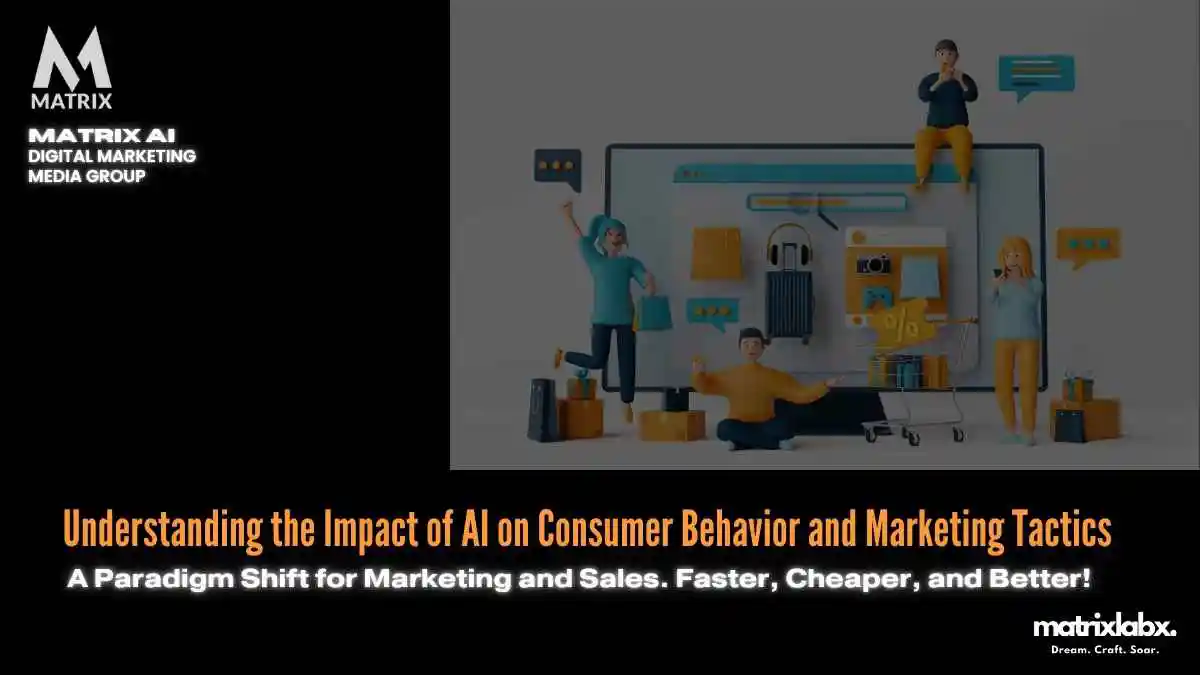Understanding the Impact of AI on Consumer Behavior and Marketing Tactics
Learn Why Understanding the Impact of AI on Consumer Behavior and Marketing Tactics.
Introduction
Here are four statistics from well-known research firms regarding how AI reshapes consumer behavior and redefines marketing tactics in the small to midsize business (SMB) market:
- AI for Personalization Leads to Higher Conversion Rates: According to research by Evergage (now part of Salesforce) in 2021, marketers report an average 63% improvement in conversion rates when using AI-driven personalization compared to generic messaging. This indicates that SMBs leveraging AI to tailor their marketing content and offers are significantly more successful in turning prospects into customers.
- AI-Powered Marketing Automation Saves Time: A 2024 report by ChatROI suggests that businesses using AI for marketing automation, including content generation for blogs and social media, experience an average savings of 20 hours per week. For SMBs with limited staff, this efficiency gain allows them to focus on strategic initiatives rather than repetitive tasks.
- Increased Sales with AI in Marketing: The Digital Marketing Institute reported that companies using AI in their marketing strategies have seen a 20% increase in sales. This demonstrates the direct positive impact of AI adoption on SMB revenue generation by enabling more effective customer targeting, engagement, and conversion.
- SMBs Expecting to Use More AI: According to the 2024 Small Business Index Report by Thryv, 43% of small business owners expect to use AI in 2025, compared to 31% in the previous year. This significant increase in anticipated adoption highlights a growing recognition among SMBs of the potential benefits of AI in various aspects of their operations, including marketing and customer engagement.
These statistics collectively illustrate the growing importance of AI for SMBs in understanding and influencing consumer behavior and optimizing their marketing efforts for better results and efficiency.
A decade ago, searching for a product involved either a trip to the store or navigating through often clunky and unintuitive online platforms.
Today, consumers can voice a query into their smartphone and receive personalized product recommendations in seconds.
This shift is underscored by a staggering statistic from Google: 27% of the global online population uses voice search on mobile (Google).
Such transformative advancements in search technology exemplify the broader impacts of artificial intelligence (AI) on consumer behavior and marketing strategies.
In the evolving digital commerce landscape, data-driven marketing strategies have become paramount. These strategies harness vast arrays of consumer data, utilizing advanced analytics to tailor marketing efforts to individual preferences and behaviors.
AI analytics is at the heart of this revolution, which leverages machine learning and predictive algorithms to understand and anticipate consumer behavior. AI tools analyze patterns in large datasets to optimize marketing tactics, enhancing customer engagement and increasing conversion rates.
Annual Marketing Budget Calculator
Businesses continue integrating AI Technologies Beyond single-shot workflows.
As businesses continue integrating AI technologies, traditional marketing paradigms are being reshaped. AI’s capabilities and implications are vast, from personalized advertising to automated customer service.
Thus, this article delves deep into how AI reshapes consumer behavior and redefines marketing tactics. Through this exploration, we aim to comprehensively understand the dynamic interplay between technological innovation and market strategies, underscored by the thesis: Understanding the Impact of AI on Consumer Behavior and Marketing Tactics.
Imagine being a seasoned gardener who’s just discovered a tool that can predict exactly when each plant will bloom, the water and sunlight needed, and how best to protect them from pests. This is akin to the revolution AI brings to marketing managers.
Just as the gardener uses this tool to ensure a vibrant, flourishing garden, AI enables marketers to understand and predict consumer behavior with unprecedented accuracy.
With AI, you can tailor marketing strategies with the precision of a master gardener caring for their prized blooms.
This technology sifts through the soil of data, uncovering insights about consumer preferences and habits that were previously hidden or too complex to decode. It helps craft personalized marketing messages that resonate deeply with individual consumers, like how the right mix of nutrients can make a specific plant thrive.
Engaging with AI means broadcasting messages, cultivating relationships, nurturing leads like delicate seedlings, and watching your market share blossom.
Embrace AI in your marketing tactics, and watch your brand grow in a garden of opportunities tailored perfectly to today’s consumers’ needs and desires.
Shifting from Lead Generation to Revenue Generation: A New Era for Marketing Managers
Unlocking 67% More Revenue: The Shift Every Marketing Manager Needs to Make
In today’s fast-paced digital landscape, marketing managers are bombarded with new strategies and tools claiming to revolutionize their approach. This statistic is not just a number—it’s a call to action for marketing leaders to reevaluate their strategies and realign their efforts with the bottom line. Schedule an appointment.
Understanding the Impact of AI on Consumer Behavior and Marketing Tactics
Case Study 1: Starbucks – Enhancing Customer Experience with AI
Brand Description and Initial Strategy
The renowned coffeehouse chain Starbucks has always prioritized customer experience and personalization. With a mission to inspire and nurture the human spirit, Starbucks set out to use artificial intelligence to enhance its marketing strategies and customer engagement.
Initially, the brand aimed to utilize AI to predict customer preferences and tailor marketing messages accordingly, focusing on building loyalty through personalized experiences.
Leveraging AI and Mitigating Failures
Starbucks implemented an AI-driven recommendation system that analyzes customer purchase history, preferences, and seasonal trends.
This system helped Starbucks create tailored marketing campaigns and promotions. For instance, the “My Starbucks Rewards” program was optimized with AI, allowing the company to offer personalized discounts and rewards based on individual buying habits.
However, the initial roll-out faced challenges, including customer privacy concerns and the complexity of integrating AI across various platforms.
Starbucks addressed these issues by ensuring transparency in data usage, emphasizing customer benefits, and enhancing data security measures.
Affordable SEO Solutions That Drive Real Results
Matrix Marketing Group Delivers Customized SEO Strategies with Transparent Pricing for Maximum ROI. See SEO Services.
Data-Driven Marketing Strategy and AI Analytics
Starbucks used AI analytics to segment its customer base effectively. By analyzing data from its mobile app and loyalty program, the brand could identify specific customer personas and deliver targeted marketing messages.
For example, it could send a latte promotion to customers who frequently purchase espresso drinks while introducing new items to more adventurous customers.
Lessons Learned
- Personalization is Key: Starbucks’ AI-driven marketing strategy’s success highlighted the importance of personalization in consumer behavior. Tailoring messages to meet individual preferences significantly boosts engagement and loyalty.
- Transparency Builds Trust: Addressing privacy concerns upfront and being transparent about data usage fosters customer trust, which is crucial when employing AI technologies.
- Continuous Improvement: Starbucks learned that AI implementation is not a one-time project; it requires continuous monitoring and adjustments based on customer feedback and behavior changes.
Case Study 2: Netflix – Predicting Viewer Preferences with AI
Brand Description and Initial Strategy
Netflix, a leading streaming service provider, revolutionized how audiences consume content.
Recognizing AI’s potential, Netflix leveraged data analytics to understand viewer preferences, optimize content recommendations, and inform its content creation strategy.
The initial strategy was to harness viewer data to predict which shows and movies would resonate with different segments of its audience.
Leveraging AI and Mitigating Failures
Netflix developed sophisticated algorithms that analyze user behavior, including viewing history, ratings, and the time of day when content is watched.
This allowed the platform to recommend personalized content to its subscribers. The brand faced early setbacks when recommendations did not align with user expectations, leading to disengagement.
To mitigate these failures, Netflix continuously refined its algorithms based on user feedback, incorporating real-time data adjustments to improve recommendation accuracy.
They also tested different marketing tactics, such as personalized thumbnails and trailers, to engage viewers better.
Companies Waste Up to 40% of Their Marketing Budget on Poorly Targeted Campaigns
Poorly targeted marketing campaigns, including those driven by outdated data or vague buyer personas, can waste up to 40% of marketing budgets annually. This highlights the need for better data management and audience segmentation strategies. (HBR)
Data-Driven Marketing Strategy and AI Analytics
Netflix’s data-driven approach allowed it to analyze vast amounts of viewer data to determine what types of shows to produce.
For example, the success of shows like “Stranger Things” was informed by data indicating a strong viewer interest in 80s nostalgia and sci-fi genres.
This analytics-driven approach ensured that the company invested in content that was more likely to succeed.
Lessons Learned
- Data-Driven Decision Making: Netflix exemplifies the power of data analytics to inform marketing strategies and content creation, showing that understanding consumer behavior is crucial to success.
- Adaptability is Essential: The streaming landscape is constantly evolving. Netflix’s ability to adapt its recommendations and marketing strategies based on real-time analytics has been key to maintaining viewer engagement and satisfaction.
- User Experience Matters: Netflix learned that enhancing the user experience through personalized recommendations and thoughtful marketing tactics significantly impacts consumer behavior, leading to higher retention rates.
Conclusion
Both Starbucks and Netflix illustrate the profound impact of AI on consumer behavior and marketing strategies.
By leveraging data-driven insights and continuously adapting to consumer preferences, brands can create personalized experiences that drive engagement and loyalty.
As AI technology evolves, understanding its implications on consumer behavior will be essential for marketers looking to stay ahead in a competitive landscape.
Return on Investment (ROI) from Thought Leadership SEO
Thought leadership SEO campaigns, which involve strategic planning and high-quality content creation, have demonstrated a return on advertising spend (ROAS) of 9.10, equating to a 748% ROI, with a typical break-even point at around 9 months. Review how to win with SEO Services.
Challenges and Opportunities: Understanding the Impact of AI on Consumer Behavior and Marketing Tactics
Challenges
- Data Privacy Concerns: With the rise of AI, the collection and analysis of consumer data have become more sophisticated. However, this raises significant privacy concerns. Consumers are increasingly wary of how their data is being used, which can lead to resistance against AI-driven marketing strategies. Companies must navigate the fine line between personalized marketing and invasive data practices, ensuring compliance with regulations such as GDPR and CCPA.
- Algorithmic Bias: AI systems can inadvertently perpetuate or amplify biases present in the training data. This can lead to marketing tactics that may not resonate with or alienate certain consumer segments. Understanding and mitigating bias in AI algorithms is essential to ensure equitable marketing practices and to avoid reputational damage.
- Rapid Technological Change: The landscape of AI and its applications in marketing is constantly evolving. Keeping up with the latest technologies, tools, and methodologies can be daunting for marketers. This requires continuous learning and adaptation, which can strain resources and lead to inconsistent marketing strategies if not managed properly.
- Consumer Skepticism: As consumers become more aware of AI’s role in marketing, skepticism may grow regarding the authenticity of personalized recommendations. Marketers must strive to build trust by being transparent about how AI influences the consumer experience. Failure to do so can lead to disengagement and a lack of brand loyalty.
Opportunities
- Enhanced Personalization: AI enables marketers to analyze vast amounts of data to deliver highly personalized experiences. By understanding individual consumer behaviors and preferences, brands can tailor their messaging and offerings, increasing engagement and higher conversion rates.
- Predictive Analytics: AI tools can analyze historical data to predict future consumer behavior. This capability allows marketers to proactively anticipate trends and adjust their strategies, leading to more effective campaigns. By leveraging predictive analytics, brands can optimize their inventory, pricing strategies, and promotional efforts, enhancing overall performance.
- Improved Customer Insights: AI can uncover patterns in consumer behavior that may not be immediately obvious through traditional analytics. By utilizing AI-driven insights, marketers can segment their audience more effectively and create targeted campaigns that resonate with specific demographics. This understanding can lead to more efficient resource allocation and improved ROI.
- Automation and Efficiency: AI can automate repetitive marketing tasks such as email campaigns, social media management, and customer service inquiries. This allows marketing teams to focus on strategic initiatives and creative problem-solving, ultimately enhancing productivity and reducing operational costs.
Importance of Understanding AI’s Impact
Understanding the impact of AI on consumer behavior and marketing tactics is crucial for several reasons:
- Strategic Decision-Making: As AI increasingly integrates into marketing strategies, brands that grasp its implications will be better positioned to make informed decisions. This understanding enables businesses to adapt their strategies in real time and remain competitive in a rapidly changing marketplace.
- Consumer Trust and Engagement: By acknowledging AI’s role and addressing consumer concerns regarding data usage, brands can foster trust and enhance consumer engagement. Transparency about AI applications helps consumers feel more comfortable with personalized marketing, leading to stronger brand loyalty.
- Driving Innovation: An in-depth understanding of AI’s capabilities and limitations can inspire marketers to innovate in their approach. This innovation is essential for differentiating brands in a crowded marketplace and can lead to developing new products, services, and marketing techniques that meet evolving consumer needs.
- Ethical Marketing Practices: As AI reshapes the marketing landscape, brands must commit to ethical practices. Understanding the ethical implications of AI in marketing helps businesses create strategies that respect consumer rights and promote positive societal outcomes, ultimately enhancing brand reputation.
While understanding AI’s impact on consumer behavior and marketing tactics presents significant challenges, AI’s opportunities offer powerful avenues for innovation, efficiency, and improved customer relationships.
Embracing this understanding is essential for brands aiming to thrive in the digital age.
Matrix Marketing Group stands at the forefront of the digital marketing landscape, leveraging advanced AI technologies to transform how businesses engage with consumers.
In the context of the article “Understanding the Impact of AI on Consumer Behavior and Marketing Tactics,” Matrix Marketing Group exemplifies the integration of AI into strategic marketing initiatives.
Their AI-driven services enable brands to gain deep insights into consumer behavior, allowing personalized marketing tactics that resonate more effectively with target audiences.
Matrix Marketing Group can identify trends and patterns that inform campaign strategies by analyzing vast data.
Understanding consumer behavior helps businesses optimize their marketing efforts, ensuring they deliver the right message to the right audience at the right time.
The article highlights how AI reshapes traditional marketing approaches, and Matrix Marketing Group embodies this shift by utilizing predictive analytics and machine learning to enhance decision-making processes.
Moreover, their focus on creating tailored content and automating marketing workflows illustrates how AI can streamline operations while improving customer experiences. As businesses strive to adapt to the evolving landscape shaped by AI, Matrix Marketing Group provides the tools and expertise necessary to harness these innovations, making them a vital partner in navigating the future of digital marketing.
In conclusion, integrating AI into consumer behavior and marketing strategies reshapes how brands engage with their audiences.
We explored how AI enhances personalization, predicts consumer preferences, and optimizes marketing tactics through data-driven insights. The article highlighted the importance of ethical considerations and transparency, ensuring that while AI drives innovation, it respects consumer privacy and autonomy.
The central thesis emphasizes that to thrive in this AI-driven era; marketers must adopt advanced technologies and foster genuine connections with consumers. The successful brands of tomorrow will harness AI’s potential while maintaining a human touch.
As we move forward, consider how your marketing strategies can evolve with AI.
Are you ready to embrace and leverage these changes to create more meaningful customer experiences?
Reflect on your approach and adapt proactively to the evolving consumer landscape. The future of marketing is not just about technology—it’s about understanding and serving consumers in deeply resonated ways.






